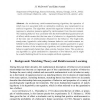267 search results - page 29 / 54 » The Dynamics of Multi-Agent Reinforcement Learning |
141
click to vote
ATAL
2005
Springer
15 years 7 months ago
2005
Springer
Reinforcement learning problems are commonly tackled with temporal difference methods, which use dynamic programming and statistical sampling to estimate the long-term value of ta...
119
click to vote
ATAL
2009
Springer
14 years 11 months ago
2009
Springer
Today's society is largely connected and many real life applications lend themselves to be modeled as multi-agent systems. Although such systems as well as their models are d...
138
click to vote
CSE
2008
IEEE
15 years 7 months ago
2008
IEEE
Ad-hoc Grids are highly heterogeneous and dynamic networks, one of the main challenges of resource allocation in such environments is to find mechanisms which do not rely on the ...
143
click to vote
AAAI
1996
15 years 2 months ago
1996
Procedural representations of control policies have two advantages when facing the scale-up problem in learning tasks. First they are implicit, with potential for inductive genera...
107
click to vote
ECAL
2005
Springer
15 years 6 months ago
2005
Springer
An evolutionary reinforcement-learning algorithm, the operation of which was not associated with an optimality condition, was instantiated in an artificial organism. The algorithm ...

